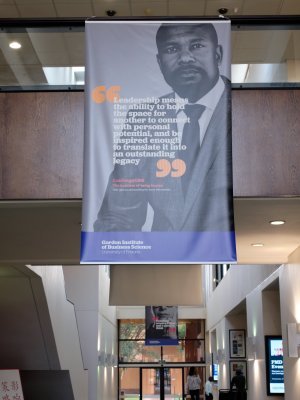Commonly, the answer to the question: “What is business coaching?” tends to be that it’s coaching applied to a business person or that a business commissions the coaching for an individual. While this might be true, we believe that business itself should have more than a background role in the coaching story. Corporate business, as a set of specific activities, with particular drivers and parameters of success, are also the dominant buyers of coaching and the relationship of the coaching world to business deserves to be better understood.
This article looks at business coaching through three business lenses. Firstly, as a result of being in demand, coaching is growing and profitable ‘business’ itself. This helps it contribute positively to other businesses. Certainly, each individual coaching practitioner should be at least authentically proficient at running their own businesses, in order to be relevant to the business market they serve. The second lens is concerned with what business coaching fundamentally is and what it is typically ‘busy’ with. Lastly, but most importantly, there is solid evidence that business coaching contributes significantly to business outcomes, enhancing business performance and results. It therefore makes good business sense to understand and use coaching in relevant ways. While coaching is a relatively new industry, it’s difficult to ignore that it’s here to stay and this is because it’s simply good business.
...business coaches work on the axis of individual and organisational need.
Coaching as business
The success of business coaching is indicated by the uptake in organisations with 25%-40% of Fortune 500 companies regularly using executive coaches. As early as 2003, the coaching market was worth $1 billion worldwide and its growth is demonstrated by its worth at $9.4 billion in 2017. It appears to be one of the fastest growing industries in the world, just behind technology. At least by the metrics of growth, coaching seems effective at interfacing on a business level with its dominant buyers – corporate business. Even its position relative to technology suggests an important insight: it is human beings that create and use technology and technology that progresses fast but lacks ‘humanness’, risks being irrelevant. While coaching is fundamentally concerned with human beings, the industry’s growth implies a level of business proficiency that allows it to be a business enabler.
What is the business of business coaching?
At GIBS, we believe (as many do), that business coaching is about coaching individuals who work in organisations, where the coaching is designed to serve both the individual and the business. This is not merely a matter of finding a convenient overlap, but rather of amplifying both and significantly enhancing the alignment between both.
Where business coaching differs from ‘life’ coaching, is that it intends to focus on individual development within, and inclusive of, the business context of that individual’s work life. Marc Kahn, author of Coaching on the Axis positions this well, explaining that business coaches work on the axis of individual and organisational need. Who an individual is fundamentally infuses that person’s work role, and similarly, an individual’s ‘work roles’ fundamentally affect their personal identity. Focusing on the nexus of the two (and mutual effect on each other) can bring positive results beyond a focus on either in isolation.
For example, if Tony is being coached on leadership themes, including how he inspires others, business coaching would also consider Tony’s leadership development within the context of his organisation’s leadership strategy. Perhaps Tony is focusing on using a personal strength as a relationship builder to develop his ability to inspire. But his coaching may then also simultaneously work on ‘driving business results through effective leadership’, as a formal pillar of (let’s say) his organisation’s ‘leadership charter’.
In the context of what business coaching is ‘busy with’, it’s also useful to explore ‘how’ it does this, particularly in reference to other approaches. Many approaches could feasibly assist Tony in his leadership development and Tony’s organisation in executing on their leadership charter. Coaching differs from other approaches like mentoring, teaching and consulting, in two distinctive ways. Firstly, coaching, at its essence, is a personal development endeavour. It works at the individual human being level. As we will explore later, this work can significantly impact organisations at the macro level, but the primary starting point for coaching is not to, for example, change organisational structure or formulate organisational strategy (such as consultants may be responsible for). The thinking, planning and execution of strategic insights and actions, of course, are driven by human beings and it’s at the potency and performance of those individuals that business coaching focuses its attention. Secondly, in coaching, the insights and action flow from the coachee. Not the other way around. The coach plays a role in eliciting these but not delivering them. A mentor or teacher is usually responsible for sharing expertise and experience and the flow of this expertise is from expert to recipient (learner). A teacher, consultant or mentor delivers expertise but doesn’t necessarily elicit it from others.
Business coaching is, therefore ‘busy with’ unlocking, eliciting and facilitating wisdom and potency in individuals. It does this in such a way that it can also improve what that individual is ‘busy with’ in their work roles and their businesses as a whole.
Business coaching helps businesses be good businesses
This improvement is good for business. Coaching is popular and continues to be, despite softening of funds for training in harsher business times. This is a sign that it’s a valuable tool in businesses. But why is this?
Coaching can certainly elevate personal well-being. There is substantial research on the benefits of coaching for individual outcomes like levels of happiness, fulfilment, resilience, work-life balance, relationships and self-confidence.
Coaching enhances personal outcomes
A newly promoted equity candidate was feeling the pressure of stepping into an executive role in a highly competitive retail environment. In addition to being one of the only women at that level, she had the pressure of the common 'impostor' syndrome plaguing many female leaders, exacerbated by the perceived crossed arms and sceptical glances from her predominantly male colleagues, who she felt, doubted her experience and ability. She needed to hold her own and not display her internalised ‘junior’ status, or allow it to affect her job. Through coaching, she had the space to access her own common sense voice of how to fulfil her role for the best benefit of the business. With hard work and by filtering the noise around generic invocations to 'be agile', 'be innovative', 'be strategic', her confidence and sense of satisfaction took a significant leap forward.
But does the positive influence on well-being extend to performance at work?
With the transition from command and control management styles of the past to an emphasis on managers empowering their subordinates, coaching also became a business tool for developing leaders' and managers' performance in their roles. Alongside this, studies began to document specific improvements in performance at the individual level. From this evidence, it’s clear that coaching both improves performance directly, and also, more indirectly, boosts factors like productivity, goal-achievement, engagement and retention, managers' emotional intelligence and interpersonal skills, team effectiveness, time management, people management capability and others. For example, the executive (from the story above) had identified critical inefficiencies in how a customer’s data and account was being managed. Through her increased confidence in her own leadership perspective, she was able to have a series of difficult conversations with both internal and external stakeholders which resulted in massive savings to the customer and which then eventually almost doubled the customer’s business with her company. This story highlights the ‘coaching on the axis’ orientation of business coaching: improved confidence and satisfaction amplified specific (required) areas of leadership performance for her. As she fully stepped into her executive role, this, in turn, improved her sense of fulfilment and enhanced her personal identity as she increasingly saw herself as a legitimate leader.
Coaching enables performance
An organisation felt that one of their managers was “too soft” on his team and did too much work for them, thereby preventing himself from doing enough of his own job. Through coaching, the manager stepped up, had to work out how to at times confront someone on his team and how to make the work land up on the right desk, giving him time to “be strategic”. The organisation felt the manager had done extremely well and had “toughened up” (in their words). The manager’s work performance and ability to confront others and delegate better was enhanced through, and alongside, his improvement in self-confidence.
The case for using coaching for improving individual and leadership effectiveness is therefore certainly compelling. In keeping with the notion that business coaching links both individual and organisational performance, we do see evidence from a wide range of studies, that coaching indeed improves overall organisational effectiveness. But is there a direct measure of the ‘harder’ effects of coaching on business?
The ‘harder’ case is certainly illustrated in the executive’s story above which resulted in both savings and doubling of the customer’s business with her company. But this case is also supported more formally in research where it seems that at least a few studies have linked ROI (return on investment) and measurable improvements in financial results, to coaching engagements (some report ROIs of between 5 and 6 times the original investment).
There is much still to do in understanding how coaching enables business and GIBS is one of the institutions which are actively researching the ‘state of play’ of coaching and its impact on organisations. But what is available to us so far seems to indicate that using coaching in the right ways does help businesses to be better businesses.
Coaching is linked to harder business results
A general manager of a region in emerging markets was being coached. He had started the regional offices and had appointed country managers in each region. His stated strategic objective was to grow the business by ‘growing his people’. Through coaching conversations, he recognised that the key way to grow the business was to truly empower each country manager and to develop the country teams. This insight was present prior to coaching but it was through coaching that he specified clear roles that he as general manager needed to take to make the generic statement “grow my people” turn into tangible execution. He brought all the country managers together quarterly (over vast distances) and invested time, energy and money in developing the strategy collaboratively as a team. He used several best practices and assessments to enhance each person’s growth and insight and appointed coaches for key country managers too. He became far better at prioritising his energy and time. Their initial plan was a target of $20 million in two years and $50 million in five years. In two years, in large part as a result of the actions above, the business turnover increased from $10 million to $100 million.

Conclusion
It’s worth remembering that while coaching can help drive business results, it also is an industry that, at its heart, is about heart. Coaching intends to keep our humanity intact, as we go about the business of our businesses. Its aims to nurture the ‘being’ in human being. Having said that, business coaching is an industry that grew quickly because it links individual and organisational well-being and performance, with the demonstrated ability to improve both. In addition to being implicitly about the individual human being, it can be said to be popular and growing because it’s simply good business.
GIBS launches its SA Coaching Landscape Index
GIBS is running a comprehensive series of three research surveys into the ‘state of play’ in coaching for three communities: coaches, coachees and corporate business. Results, interpretations and ‘how-to guides’ based on the findings will become available in three iterations through 2019. If you are interested in receiving the survey results, contact Moroka on MokgokoM@gibs.co.za

Alison Reid is the Director of Personal and Applied Learning, responsible for Coaching and Facilitation at GIBS. She is a coach holding a Master’s degree in Executive Business Coaching and accredited with the ICF (International Coaching Federation), AoEC (Academy of Executive Coaching), IMCSA (Institute for Management Consultants) and (ISPSO) International Society for the Psychoanalytic Study of Organizations. She is a practitioner, educator and researcher and believes coaching has the power to catalyse significant change for individuals and organisations.










